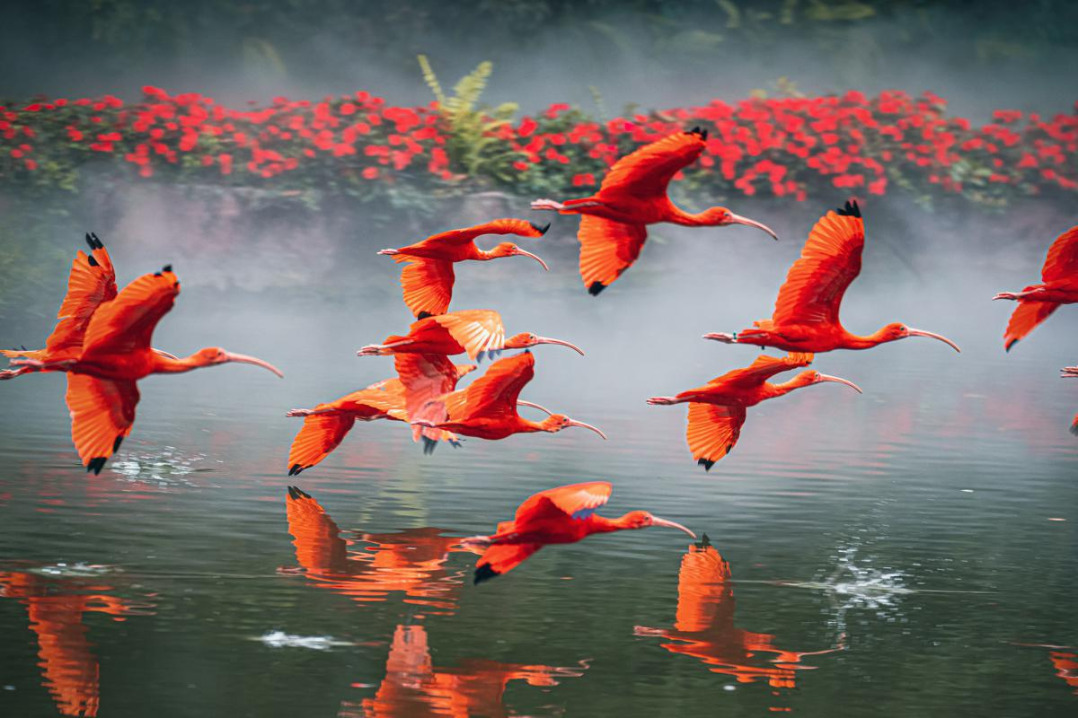Removal of fish farms improves water quality of lakes


As the weather turned cold, most plants near Xiliang Lake withered. Little green remained around the fog-shrouded body of water in Xianning, Hubei province, in the Yangtze River Basin.
But if you gaze into the water, you might see a different scenario. Aquatic plants cover almost every inch of the lake's bottom at depths averaging about 2 meters. Their vivid green color can be seen easily despite the poor visibility brought by the clouds.
About two years ago, however, what could be seen stood in stark contrast to the current view.
"Two-thirds of the lake was covered with net cages for fish farming," said Zuo Zhiguo, head of the lake's management and law enforcement bureau. The water was so dirty it looked like tung oil, which is yellowish. And the water stank, he recalled.
The turning point for the lake's environment came in January 2016, when President Xi Jinping presided over a national conference in Chongqing about the Yangtze River Economic Belt. Xi said concerted efforts should be undertaken to protect the Yangtze, the country's longest waterway, and excessive development of the river should be banned.
Zuo said an action plan was developed to remove all the net cages in the 80-square-kilometer Xiliang Lake by the end of 2016, and work was completed by April the following year.
To restore the lake after removing the net cages, Zuo said local authorities followed the principle of letting nature restore itself, which was included in an address delivered by Xi at the 19th National Congress of the Communist Party of China in October 2017.
Fishing was banned in April 2018, and the bureau strengthened law enforcement to crack down on illegal exploitation of lake resources, Zuo added.
Since 2018, the bureau has discovered 168 violations involving electrofishing, gathering freshwater snails and picking aquatic plants. Twenty-one people received criminal punishments of up to half a year in prison, he said.
In addition to intensifying patrols, employees of the bureau advertised regulations designed to protect the lake, he added.
Zuo said the work has yielded good results. Before the net cages were removed, the quality of water in the lake had remained below Grade IV, the second-lowest in the country's five-tier water quality system. Currently, 65 percent of the lake has water above Grade III.
Instead of the net cages, visitors can now observe birds by the hundreds over the lake.
Honghu Lake in Jingzhou, Hubei, has also improved significantly, as local authorities have returned reclaimed land to the 414-square-kilometer lake and have forbidden fish farming.
At the turn of the new millennium, 90 percent of the lakes' natural wetlands had been degraded by farming activities. While some areas were being used as farmland, others were occupied by net cages for fish farming, recalled Zhu Junhua, administrative head of the Honghu Wetland Nature Reserve.
As of the end of 2018, more than 15,800 hectares of farmland and fish farms had been returned to the lake. With a significant decrease of human activity, the lake has seen rapid growth of aquatic plants and a marked increase in birds, he said.
"Areas with lotus increased by more than 5,000 hectares, and 20 percent of the lake bottom is now covered by plants," he said, adding that water quality in key areas of the lake had improved to Grade III. Previously, some areas of the lake had water even worse than the lowest category, Grade V.
The lake was once visited by merely several thousands of migrant birds annually. So far this winter, it has received more than 100,000, he said.
"The lake was so beautiful when I was a little boy. There were lotuses everywhere ... You could even drink lake water directly," local resident Zhang Shengyuan, 61, said.
"Though it will take time to see the lake return to what it was in my memory, it is beginning to come back," Zhang said.
- Beijing's Summer Palace rolls out multi-language translation machine
- Wildlife rescuer takes care of vulnerable animals like a parent
- Zhang Youxia meets with chief of Pakistani army
- Model UN conference gathers global students in Wuxi
- Chikungunya fever cases reported in Guangzhou
- Qingdao to host 10th China International Copyright Expo




































